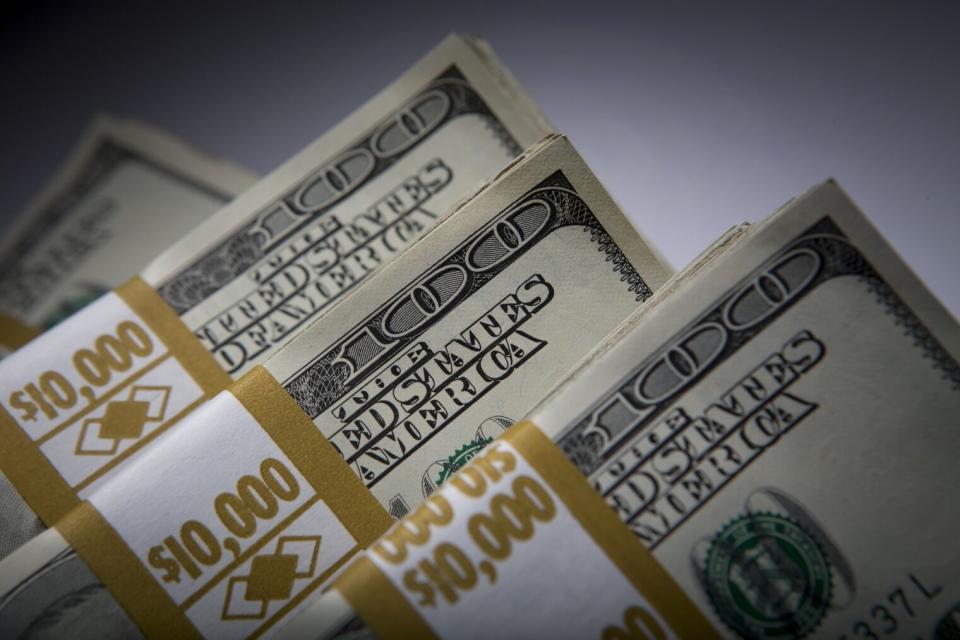
Some key market metrics are starting to suggest the Trump-inspired rally in the dollar may have plateaued, as bullishness fueled by the US election wanes.
Bloomberg’s gauge of the currency fell for a third day on Tuesday after rising to a two-year high last week. Momentum indicators are signaling further upside may be limited in the short-term. Investor flow has become less one-sided, according to traders, and views about the currency’s direction are starting to become more circumspect.
“The strong-dollar trend after the US election is certainly entering more choppy waters,” said Antony Foster, London-based head of Group-of-10 spot trading at Nomura International Plc.
The world’s reserve currency has been rallying since late September, fueled in part by President-elect Donald Trump’s plans to raise tariffs, and concern his agenda will boost inflation and deter the Federal Reserve from cutting interest rates. The Bloomberg Dollar Spot Index is up 5.3% this year.
On the technical side, the dollar’s slow stochastics, a momentum indicator, signal the currency has reached so-called overbought territory. JPMorgan Chase & Co.’s emerging market FX Risk Appetite Index triggered a short dollar signal at the Nov. 15 close, according to Niraj Athavle, head of sales and marketing at the bank in Singapore.
Investor views about the fundamentals of other major currencies are also a factor. The euro has bounced off support at $1.05 after a three-month retreat. Additional technical support for the single currency sits at its 2023 low of $1.0448.
“The sentiment toward the euro here is very mixed, with some talking about parity and below, and others believing this is the dip to buy,” Nomura’s Foster said. “We have seen quite a few accounts taking profit on euro shorts, but by no means all accounts.”
The dollar is also struggling to advance past 155 yen, even though Bank of Japan Governor Kazuo Ueda avoided giving a clear hint on Tuesday that he will raise interest rates at the central bank’s December meeting.
“Flows have been two way in the yen” for the most part, Foster said.
What Bloomberg Strategists say…
“The US dollar will struggle to regain its recent peaks in the short term after the currency’s post-election rally overshot judging by its relative yield dynamics.”
Garfield Reynolds, Markets Live strategist
Even leveraged funds, which initially added to bets that the dollar would rally versus currencies such as the euro, offshore yuan and yen following the US election, appear to be paring bets on a continued greenback gains.
“In the last one week, globally, there has been a net selling flow overall of the dollar,” JPMorgan’s Athavle said. “Asset managers were slight dollar buyers versus the euro and sterling, but this was offset by macro funds selling the dollar against the euro.”
The case for a stronger US currency, of course, is still being touted by many on Wall Street. Hedge funds, asset managers and other speculators have been positioning for further advances. They held some $17.7 billion in contracts that stand to benefit from a stronger dollar, according to the latest Commodity Futures Trading Commission data for the week ended Nov. 12.
Strategists at Goldman Sachs this month abandoned their long-held view of dollar depreciation given the reasons they see for the US currency to stay stronger “for longer.” The likelihood that Trump’s protectionist policies reignite inflation and cause the Federal Reserve to slow the pace of its interest-rate cuts should drive a trade-weighted index of the greenback up some 3% over the next year, they said.
And although Morgan Stanley’s team thinks the dollar will stay more range-bound in 2025, they expect it to keep climbing this year.
“The new administration’s domestic policies are likely to keep the economy quite hot, and trade policy will keep some upward pressure on the dollar as well,” said Helen Given, a foreign-exchange trader at Monex. “There is room for some downside if these policies either aren’t enacted or don’t work, but the risks for the dollar remain tilted to the upside.”


